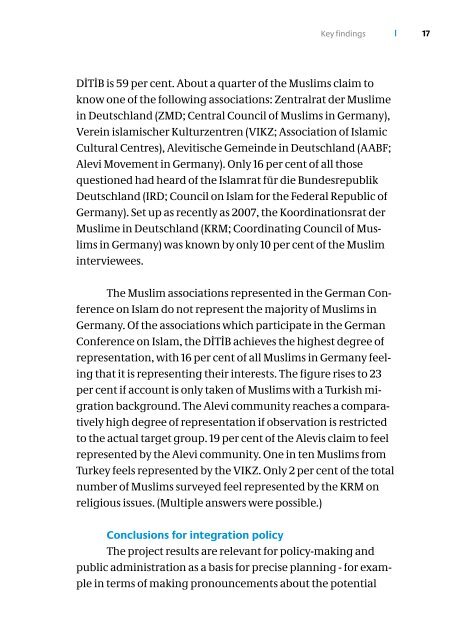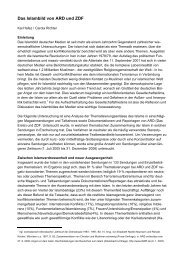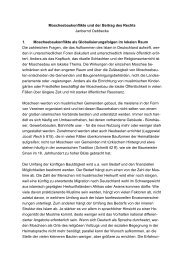- Page 1: Muslim Life in Germany A study cond
- Page 4 and 5: 4 Foreword Foreword Federal Ministe
- Page 6 and 7: 6 1 2 3 4 5 6 7 8 9 10 Overview of
- Page 8 and 9: 8 Table of contents 4 5 Religiousne
- Page 10 and 11: 10 Table of contents 6 7 8 9 10 Con
- Page 12 and 13: 12 Key findings The Muslim section
- Page 14 and 15: 14 Key findings and - in the case o
- Page 18 and 19: 18 Key findings requirement for Isl
- Page 20 and 21: 20 Introduction lim countries were
- Page 22 and 23: 22 Introduction ganisations that ha
- Page 24 and 25: 24 Introduction interest, for examp
- Page 26 and 27: 26 Introduction telsmann foundation
- Page 28 and 29: 28 Introduction children than their
- Page 30 and 31: 30 Introduction unwilling or unable
- Page 32 and 33: 32 Introduction in Germany. The lat
- Page 34 and 35: 34 Introduction analyses in chapter
- Page 36 and 37: 36 Introduction ity in this project
- Page 38 and 39: 38 Introduction in question are als
- Page 40 and 41: 40 Introduction The response rate i
- Page 42 and 43: 42 Introduction All in all in metho
- Page 44 and 45: 44 Introduction The questions withi
- Page 46 and 47: 46 Introduction The focus topics of
- Page 48 and 49: 48 Introduction Of the 5,268 interv
- Page 50 and 51: 50 Introduction Table 2: Interviewe
- Page 52 and 53: 52 Introduction Figure 1: Flow char
- Page 54 and 55: 54 How many Muslims live in Germany
- Page 56 and 57: 56 How many Muslims live in Germany
- Page 58 and 59: 58 How many Muslims live in Germany
- Page 60 and 61: 60 How many Muslims live in Germany
- Page 62 and 63: 62 How many Muslims live in Germany
- Page 64 and 65: 64 How many Muslims live in Germany
- Page 66 and 67:
66 How many Muslims live in Germany
- Page 68 and 69:
68 How many Muslims live in Germany
- Page 70 and 71:
70 How many Muslims live in Germany
- Page 72 and 73:
72 How many Muslims live in Germany
- Page 74 and 75:
74 How many Muslims live in Germany
- Page 76 and 77:
76 How many Muslims live in Germany
- Page 78 and 79:
78 How many Muslims live in Germany
- Page 80 and 81:
80 How many Muslims live in Germany
- Page 82 and 83:
82 How many Muslims live in Germany
- Page 84 and 85:
84 How many Muslims live in Germany
- Page 86 and 87:
86 How many Muslims live in Germany
- Page 88 and 89:
88 How many Muslims live in Germany
- Page 90 and 91:
90 How many Muslims live in Germany
- Page 92 and 93:
92 How many Muslims live in Germany
- Page 94 and 95:
94 How many Muslims live in Germany
- Page 96 and 97:
96 How many Muslims live in Germany
- Page 98 and 99:
98 How many Muslims live in Germany
- Page 100 and 101:
100 How many Muslims live in German
- Page 102 and 103:
102 How many Muslims live in German
- Page 104 and 105:
104 Sociodemographics and migration
- Page 106 and 107:
106 Sociodemographics and migration
- Page 108 and 109:
108 Sociodemographics and migration
- Page 110 and 111:
110 Sociodemographics and migration
- Page 112 and 113:
112 Sociodemographics and migration
- Page 114 and 115:
114 Sociodemographics and migration
- Page 116 and 117:
116 Sociodemographics and migration
- Page 118 and 119:
118 Sociodemographics and migration
- Page 120 and 121:
120 Sociodemographics and migration
- Page 122 and 123:
122 Sociodemographics and migration
- Page 124 and 125:
124 Sociodemographics and migration
- Page 126 and 127:
126 Sociodemographics and migration
- Page 128 and 129:
128 Religiousness and religious pra
- Page 130 and 131:
130 Religiousness and religious pra
- Page 132 and 133:
132 Religiousness and religious pra
- Page 134 and 135:
134 Religiousness and religious pra
- Page 136 and 137:
136 Religiousness and religious pra
- Page 138 and 139:
138 Religiousness and religious pra
- Page 140 and 141:
140 Religiousness and religious pra
- Page 142 and 143:
142 Religiousness and religious pra
- Page 144 and 145:
144 Religiousness and religious pra
- Page 146 and 147:
146 Religiousness and religious pra
- Page 148 and 149:
148 Religiousness and religious pra
- Page 150 and 151:
150 Religiousness and religious pra
- Page 152 and 153:
152 Religiousness and religious pra
- Page 154 and 155:
154 Religiousness and religious pra
- Page 156 and 157:
156 Religiousness and religious pra
- Page 158 and 159:
158 Religiousness and religious pra
- Page 160 and 161:
160 Religiousness and religious pra
- Page 162 and 163:
162 Religiousness and religious pra
- Page 164 and 165:
164 Religiousness and religious pra
- Page 166 and 167:
166 Religiousness and religious pra
- Page 168 and 169:
168 Religiousness and religious pra
- Page 170 and 171:
170 Religiousness and religious pra
- Page 172 and 173:
172 Religiousness and religious pra
- Page 174 and 175:
174 Religiousness and religious pra
- Page 176 and 177:
176 Religiousness and religious pra
- Page 178 and 179:
178 Religiousness and religious pra
- Page 180 and 181:
180 Religiousness and religious pra
- Page 182 and 183:
182 Religiousness and religious pra
- Page 184 and 185:
184 Religiousness and religious pra
- Page 186 and 187:
186 Religiousness and religious pra
- Page 188 and 189:
188 Religiousness and religious pra
- Page 190 and 191:
190 Religiousness and religious pra
- Page 192 and 193:
192 Religiousness and religious pra
- Page 194 and 195:
194 Religiousness and religious pra
- Page 196 and 197:
196 Religiousness and religious pra
- Page 198 and 199:
198 Aspects of Integration 5 Aspect
- Page 200 and 201:
200 Aspects of Integration and open
- Page 202 and 203:
202 Aspects of Integration correspo
- Page 204 and 205:
204 Aspects of Integration nominati
- Page 206 and 207:
206 Aspects of Integration Figure 5
- Page 208 and 209:
208 Aspects of Integration Figure 5
- Page 210 and 211:
210 Aspects of Integration It is al
- Page 212 and 213:
212 Aspects of Integration No direc
- Page 214 and 215:
214 Aspects of Integration 5.1.2 Ga
- Page 216 and 217:
216 Aspects of Integration correspo
- Page 218 and 219:
218 Aspects of Integration with the
- Page 220 and 221:
220 Aspects of Integration A very h
- Page 222 and 223:
222 Aspects of Integration The iden
- Page 224 and 225:
224 Aspects of Integration entitlin
- Page 226 and 227:
226 Aspects of Integration Table 37
- Page 228 and 229:
228 Aspects of Integration There is
- Page 230 and 231:
230 Aspects of Integration 5.1.3 Ge
- Page 232 and 233:
232 Aspects of Integration (figure
- Page 234 and 235:
234 Aspects of Integration This res
- Page 236 and 237:
236 Aspects of Integration those wi
- Page 238 and 239:
238 Aspects of Integration Table 41
- Page 240 and 241:
240 Aspects of Integration new entr
- Page 242 and 243:
242 Aspects of Integration Table 42
- Page 244 and 245:
244 Aspects of Integration 5.2 Soci
- Page 246 and 247:
246 Aspects of Integration of socia
- Page 248 and 249:
248 Aspects of Integration Almost h
- Page 250 and 251:
250 Aspects of Integration members
- Page 252 and 253:
252 Aspects of Integration The Germ
- Page 254 and 255:
254 Aspects of Integration A breakd
- Page 256 and 257:
256 Aspects of Integration have les
- Page 258 and 259:
258 Aspects of Integration former Y
- Page 260 and 261:
260 Aspects of Integration Table 45
- Page 262 and 263:
262 Aspects of Integration 5.2.2.4
- Page 264 and 265:
264 Aspects of Integration Figure 7
- Page 266 and 267:
266 Aspects of Integration A multiv
- Page 268 and 269:
268 Aspects of Integration religion
- Page 270 and 271:
270 Aspects of Integration Overall,
- Page 272 and 273:
272 Aspects of Integration Figure 7
- Page 274 and 275:
274 Aspects of Integration With reg
- Page 276 and 277:
276 Aspects of Integration These re
- Page 278 and 279:
278 Aspects of Integration of labou
- Page 280 and 281:
280 Aspects of Integration Figure 8
- Page 282 and 283:
282 Aspects of Integration per cent
- Page 284 and 285:
284 Aspects of Integration Among th
- Page 286 and 287:
286 Aspects of Integration Just und
- Page 288 and 289:
288 Aspects of Integration The degr
- Page 290 and 291:
290 Aspects of Integration Figure 8
- Page 292 and 293:
292 Aspects of Integration Caution
- Page 294 and 295:
294 Concise profiles of the migrant
- Page 296 and 297:
296 Concise profiles of the migrant
- Page 298 and 299:
298 Concise profiles of the migrant
- Page 300 and 301:
300 Concise profiles of the migrant
- Page 302 and 303:
302 Concise profiles of the migrant
- Page 304 and 305:
304 Concise profiles of the migrant
- Page 306 and 307:
306 Concise profiles of the migrant
- Page 308 and 309:
308 Concise profiles of the migrant
- Page 310 and 311:
310 Summary and conclusion 7 Summar
- Page 312 and 313:
312 Summary and conclusion One of t
- Page 314 and 315:
314 Summary and conclusion are quit
- Page 316 and 317:
316 Summary and conclusion Muslims
- Page 318 and 319:
318 Summary and conclusion lessons;
- Page 320 and 321:
320 Summary and conclusion per cent
- Page 322 and 323:
322 Summary and conclusion countrie
- Page 324 and 325:
324 Summary and conclusion German (
- Page 326 and 327:
326 Summary and conclusion sonal re
- Page 328 and 329:
328 Summary and conclusion naturali
- Page 330 and 331:
330 Summary and conclusion and scho
- Page 332 and 333:
332 Summary and conclusion other Mu
- Page 334 and 335:
334 Summary and conclusion wear a h
- Page 336 and 337:
336 Bibliography Babka von Gostomsk
- Page 338 and 339:
338 Bibliography Brettfeld, Katrin;
- Page 340 and 341:
340 Bibliography Dietrich, Myrian (
- Page 342 and 343:
342 Bibliography Frey, James H.; Ku
- Page 344 and 345:
344 Bibliography Harkness, Janet; S
- Page 346 and 347:
346 Bibliography Haug, Sonja; Sauer
- Page 348 and 349:
348 Bibliography Jacobsen, Karen; L
- Page 350 and 351:
350 Bibliography Kleindienst-Cachay
- Page 352 and 353:
352 Bibliography Oestreich, Heide (
- Page 354 and 355:
354 Bibliography Salentin, Kurt (20
- Page 356 and 357:
356 Bibliography Sinus Sociovision
- Page 358 and 359:
358 Bibliography Strømsnes, Kristi
- Page 360 and 361:
360 Bibliography Wunn, Ina (2007):
- Page 362 and 363:
362 Abbrevations/Glossary RAM Repre
- Page 364 and 365:
364 Questionnaire
- Page 366 and 367:
366 Questionnaire
- Page 368 and 369:
368 Questionnaire
- Page 370 and 371:
370 Questionnaire
- Page 372 and 373:
372 Questionnaire
- Page 374 and 375:
374 Questionnaire
- Page 376 and 377:
376 Questionnaire
- Page 378 and 379:
378 Questionnaire
- Page 380 and 381:
380 Questionnaire
- Page 382 and 383:
382 Questionnaire
- Page 384 and 385:
384 Questionnaire
- Page 386 and 387:
386 Questionnaire
- Page 388 and 389:
388 Questionnaire
- Page 390 and 391:
390 Questionnaire
- Page 392 and 393:
392 Questionnaire
- Page 394 and 395:
394 Questionnaire
- Page 396 and 397:
396 Questionnaire
- Page 398 and 399:
398 Questionnaire
- Page 400 and 401:
400 Questionnaire
- Page 402 and 403:
402 Questionnaire
- Page 404 and 405:
404 Questionnaire
- Page 406 and 407:
406 Questionnaire
- Page 408 and 409:
408 Questionnaire
- Page 410 and 411:
410 Questionnaire
- Page 412 and 413:
412 Questionnaire
- Page 414 and 415:
414 Questionnaire
- Page 416 and 417:
416 Questionnaire
- Page 418 and 419:
418 Questionnaire
- Page 420 and 421:
420 Questionnaire
- Page 422 and 423:
422 Index of tables Table 8: Share
- Page 424 and 425:
424 Index of tables Table 27: Parti
- Page 426 and 427:
426 Index of tables Table 43: Membe
- Page 428 and 429:
428 Index of illustrations Figure 1
- Page 430 and 431:
430 Index of illustrations Figure 3
- Page 432 and 433:
432 Index of illustrations Figure 5
- Page 434 and 435:
434 Index of illustrations Figure 7
- Page 436:
Imprint Published by: Federal Offic





